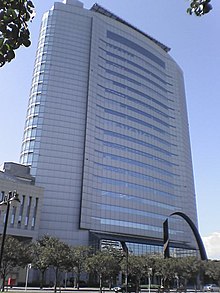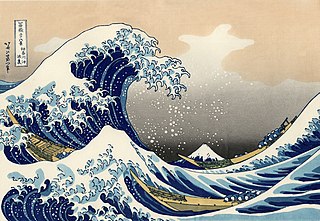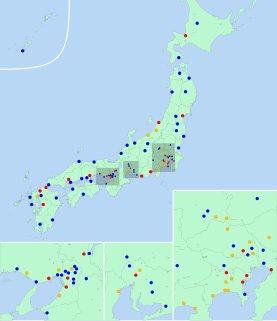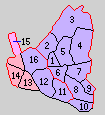| Takasaki 高崎市 | |||
|---|---|---|---|
| Core city | |||
City view from Takasaki Kannon | |||
| |||
 Location of Takasaki in Gunma Prefecture | |||
| Coordinates: 36°19′18.8″N139°0′11.8″E / 36.321889°N 139.003278°E Coordinates: 36°19′18.8″N139°0′11.8″E / 36.321889°N 139.003278°E | |||
| Country | Japan | ||
| Region | Kantō | ||
| Prefecture | Gunma Prefecture | ||
| Government | |||
| • Mayor | Kenji Tomioka (since May 2011) | ||
| Area | |||
| • Total | 459.16 km2 (177.28 sq mi) | ||
| Population (December 2015) | |||
| • Total | 371,750 | ||
| • Density | 810/km2 (2,100/sq mi) | ||
| Time zone | Japan Standard Time (UTC+9) | ||
| Symbols | |||
| • Tree | Zelkova serrata , Cyclobalanopsis | ||
| • Flower | Sakura | ||
| • Bird | Japanese bush-warbler | ||
| Phone number | 027-321-111 | ||
| Address | Takamatsu-cho 35-1, Takasaki-shi, Gunma-ken 370-8501 | ||
| Website | http://www.city.takasaki.gunma.jp/ | ||

Takasaki(高崎市Takasaki-shi, [takasakiɕi] ) is a city located in Gunma Prefecture, Japan. As of December 2015, the city had an estimated population of 371,750, and a population density of 810 persons per km2. Its total area is 459.16 square kilometres (177.28 sq mi). Takasaki is famous as the hometown of the Daruma doll, theoretically representing the Buddhist sage Bodhidharma and in modern practice a symbol of good luck.

A city is a local administrative unit in Japan. Cities are ranked on the same level as towns and villages, with the difference that they are not a component of districts. Like other contemporary administrative units, they are defined by the Local Autonomy Law of 1947.

Gunma Prefecture is a prefecture of Japan located in the Kantō region. Its capital is Maebashi.

Japan is an island country in East Asia. Located in the Pacific Ocean, it lies off the eastern coast of the Asian continent and stretches from the Sea of Okhotsk in the north to the East China Sea and the Philippine Sea in the south.






















